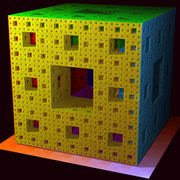I'd like to talk about space, time, and the beginning of the universe, but primarily about time.
The way I see it, there are two distinct possibilities for time. Either one can trace time infinitely far back into the past, or one can only trace time a finite distance into the past. Both of these present interesting problems and raise several speculative questions.
If time can stretch infinitely far into the past, then how are we here? If we are infinitely far ahead of the "beginning" of time, then how is it that we can exist? After all, if after an eternity, time ends, then time will NEVER end, so if an infinite number of events had to precede our existence, they would never have stopped playing out, and so we wouldn't exist.
If time had a beginning, then it is safe to say that there was nothing before that beginning, because some time reference is necessary in order for any sort of causality. Nothing can happen, as there is no time in which it could happen and all events create changes in the environment around them, thus because change is impossible without an "after" state to be changed into, it is safe to say that nothing happened before time. Asking what was before time would be like asking what's North of the North Pole, it doesn't make any sense. Thus, nothing could have made time come into existence.
Now, if time did have a beginning, then its coming to be was without cause. How far back would it have spontaneously happened? Was time created at the big bang, or was there some type of time reference before the big bang occurred?
Some scientists believe that there was a collision of two p - branes (Some really complex string theory. P - branes are contorted p dimensional objects that are purported to exist according to string theory.) that caused the big bang. Well, by that conception, even if our current space-time perspective didn't exist when this collision occurred, some temporal reference, and for that matter some spacial reference, must have existed during said collision. Other cosmologists, like Stephen Hawking, tend to believe that there was no time before the big bang.
And herein lies the problem. Either we must accept that there is some temporal reference, which may or may not be our own in this universe, that extends infinitely far into the past, or we must accept that some temporal reference, which again, may or may not be our own, came into existence without prior cause, as cause requires time. Both of these propositions are difficult to accept, but clearly, one of them must be true, as they are the only two logical possibilities.
Others suggest that we introduce a god into the equation to explain the origins of time. However, not only does this not answer the question of where time came from, it also raises further questions, of particular interest the question of "From whence cometh God?"
There are three possible answers to this question. The first is that God came into existence through some as-of-yet not understood natural process. This obviously doesn't answer the question of the origins of time, as time would have to have preceded this god in order for such processes to bring it into existence. At best, this god could be an explanation for the origins of time in our universe.
The second and third possibilities are that God always existed, or that God came into existence without a cause, but these are just the same problems as before with a god replacing time. It is quite clear that a god capable of creating entire universes would be vastly more complex than time. After all, even we simple humans are far more complex than space-time.
So, if God could have always existed, or if God could come into existence without cause, why couldn't the same be applied to time, especially since time is a much simpler entity for whose existence a vast body of evidence and theory exists, which is more than we can say for a god. Furthermore, how could God exist outside of space or time? How could God decide to create time while existing in the absence of time? These two questions are far more complex than the problems presented by the two views of time.
All in all, the origin of time is a question for which we do not currently posses the tools to answer and for which we may never posses the tools to answer. Perhaps it will always be a mystery to us. Whether or not it will always be a mystery, it is obvious that it currently is a mystery, so all of this work is pure speculation. The only thing that is known is this: either time always existed or it had a beginning.
Friday, August 29, 2008
Subscribe to:
Post Comments (Atom)
.jpg)


No comments:
Post a Comment